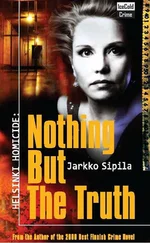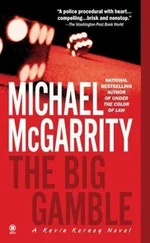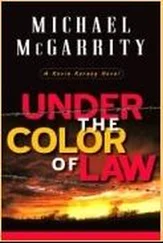Michael McGarrity - Nothing But Trouble
Здесь есть возможность читать онлайн «Michael McGarrity - Nothing But Trouble» весь текст электронной книги совершенно бесплатно (целиком полную версию без сокращений). В некоторых случаях можно слушать аудио, скачать через торрент в формате fb2 и присутствует краткое содержание. Жанр: Триллер, на английском языке. Описание произведения, (предисловие) а так же отзывы посетителей доступны на портале библиотеки ЛибКат.
- Название:Nothing But Trouble
- Автор:
- Жанр:
- Год:неизвестен
- ISBN:нет данных
- Рейтинг книги:4 / 5. Голосов: 1
-
Избранное:Добавить в избранное
- Отзывы:
-
Ваша оценка:
- 80
- 1
- 2
- 3
- 4
- 5
Nothing But Trouble: краткое содержание, описание и аннотация
Предлагаем к чтению аннотацию, описание, краткое содержание или предисловие (зависит от того, что написал сам автор книги «Nothing But Trouble»). Если вы не нашли необходимую информацию о книге — напишите в комментариях, мы постараемся отыскать её.
Nothing But Trouble — читать онлайн бесплатно полную книгу (весь текст) целиком
Ниже представлен текст книги, разбитый по страницам. Система сохранения места последней прочитанной страницы, позволяет с удобством читать онлайн бесплатно книгу «Nothing But Trouble», без необходимости каждый раз заново искать на чём Вы остановились. Поставьте закладку, и сможете в любой момент перейти на страницу, на которой закончили чтение.
Интервал:
Закладка:
“I think he’ll be glad to see the last of me,” Sara replied with a smile.
“You’re welcome in this house anytime you decide to return.”
Impulsively, Sara hugged Edna as though she were an old and dear friend.
Fitzmaurice arrived to find the two women chatting like magpies, which continued over coffee in the living room. When he was finally able to suggest that it was time to take Sara back to her hotel, she reluctantly agreed.
She left Edna on the front stoop with thanks for a scrumptious meal and a promise to visit again, then climbed into Fitzmaurice’s car and waved good-bye.
Fitzmaurice started the engine, beeped the horn, and drove away. “The text messages Spalding sent to Paquette’s computer don’t help us one bit,” he said. “They were all about small changes he wanted the builder to make to the architect’s blueprints.”
“That’s it?”
“Afraid so.” He glanced at Sara. “I think we need to agree upon a plan of action in the morning. I can’t keep the number of people assigned to the case working any longer than that. Orders from the higher-ups.”
“Okay,” Sara said. “We’ll figure something out in the morning.”
At the hotel she thanked him for the wonderful evening, complimented him on his delightful family, and took the lift to her room, wishing Kerney and Patrick had been with her to meet Clan Fitzmaurice.
It was eleven p.m. in Dublin, and four in the afternoon in Santa Fe, but Sara was too drained to call Kerney or even check her e-mail for messages. She got ready for bed, her thoughts firmly fixed on Spalding and what to do about catching him come morning.
Chapter Nine
As Brigadier General Stuart Thatcher saw it, he’d risen through the ranks because he was objective, ambitious, and maintained a healthy skepticism about other people’s motives. Accordingly, he was constantly on guard for any sign of disloyalty from his subordinates or any outside threats to his authority.
On Friday, as he was about to leave the office at the end of the day, a memo from the vice chief of staff had been hand-delivered by his aide, advising Thatcher that Lieutenant Colonel Sara Brannon had been tasked to carry out a special courier assignment effective immediately. The memo contained no specifics as to the whys or wherefores, nor had Thatcher been consulted on the matter. His authority had been undermined, and he was desperate to know why.
Officially there wasn’t anything Thatcher could do about it other than defer to the vice chief. Still, he fumed that Clarke had not even given him the courtesy of a call about needing Brannon for a special detail. Because Henry Powhatan Clarke was clearly Brannon’s mentor and protector, Thatcher couldn’t help but wonder if hidden motives were in play.
Since her arrival at the military police directorate, Brannon had caused Thatcher nothing but trouble. It had started with her assignment to revise sexual-assault criminal investigation protocols and procedures, which she’d turned into an indictment against the army for failure to prosecute offenders and adequately protect victims.
Her findings had reached the halls of Congress, and it had taken a concerted effort to keep the situation from becoming an embarrassment to the service while preserving the careers of several ranking, highly connected officers. Fortunately, Thatcher’s second cousin, U.S. Senator Howard Ballard Rutledge, chairman of the Senate Armed Services Committee, had buried Brannon’s report under the provisions of the National Security Act. But from that moment on Thatcher had kept a watchful eye on Brannon and her work, reviewing it in exhaustive detail.
Thatcher had hoped to quash Brannon’s chances for promotion by holding her back from accepting a plum temporary duty assignment with the training branch, and giving her a less than exemplary efficiency rating prior to her departure from his command. But General Clarke had outmaneuvered Thatcher and quashed his plans.
He wondered what Clarke and Brannon were up to and had spent the last two days discreetly trying to learn the nature of Brannon’s assignment. People he could usually rely on for information had professed no knowledge, and all his attempts to tease out any particulars from collateral sources failed.
Alarmed and convinced he was a target of some scheme hatched by Clarke and Brannon to ruin him, Thatcher decided to uncover the threat on his own and counteract it. Late Tuesday evening, after the personnel in Brannon’s section had left for the day, he exercised his authority to conduct a security audit of her workstation and began going through her files, paperwork, and notes in minute detail, searching for anything that would confirm his suspicions and reveal the nature of the plot against him.
In the top drawer of Brannon’s desk he found a file containing computer printouts of her outgoing telephone calls. Some time back Brannon had placed a number of calls to the Quartermaster Corps and the army forensic lab. He knew of no reason for her to do that. Additionally, over a considerable period of time, Brannon had also telephoned the Royal Canadian Mounted Police. One call had been made the day before Clarke had cut her special orders. What was that all about?
Thatcher decided to dig deeper and began dialing the numbers. Within short order he had duty officers at the Quartermaster Corps and the forensic lab scrambling to locate any documents or memorandums to or from Brannon. Then he phoned the Royal Canadian Mounted Police and spoke to a supervisor, who told him his department routinely kept in contact with Brannon regarding the status of an army deserter named George Spalding.
“What is the current status of the case?” Thatcher asked.
“Spalding is still at large,” the officer replied. “But based on a close watch list of one of Spalding’s known friends, we now have reason to suspect that he may be in Ireland.”
“Was this information shared with Colonel Brannon?” Thatcher asked.
“Yes, the colonel was advised.”
Thatcher thanked the officer and hung up. Well over a year ago the Spalding case had been transferred from Brannon to army CID. Yet Brannon had continued to follow up on the investigation without his knowledge or authorization. What was she up to and why all the secrecy?
He called back the duty officers and told them to concentrate on looking for specific information to or from Brannon that pertained to the Spalding investigation.
Within the hour Thatcher hit pay dirt. Long after the case had been transferred, Brannon had requested a handwriting analysis on documents she’d requested from the Quartermaster Corp which showed that Thomas Loring Carrier had, during the Vietnam War, forged signatures on personal-effects release forms.
Brannon had obviously targeted Carrier as a member of the smuggling ring Spalding had operated in Vietnam, which was completely incredible to Thatcher. Tom Carrier was no common criminal. A born-again Christian and a great American, Carrier had the ear of important people in the president’s inner circle. Brannon’s assumptions about him were simply scurrilous.
Had Brannon sidestepped him because of his friendship with Carrier and taken her unfounded suspicions to General Clarke? If so, why now?
He ran a hand through his thinning hair. He didn’t like Brannon. She was an officer who subtly challenged his authority in ways that avoided outright censure, who had a pattern of consistently maneuvering behind his back, and had no allegiance to the command ethics of the army.
Thatcher tapped his fingers on the desktop. Brannon had been tasked by Clarke on a secret assignment one day after she’d learned from the RCMP that Spalding might have surfaced in Ireland. Could it be that was where Clarke had sent her?
Читать дальшеИнтервал:
Закладка:
Похожие книги на «Nothing But Trouble»
Представляем Вашему вниманию похожие книги на «Nothing But Trouble» списком для выбора. Мы отобрали схожую по названию и смыслу литературу в надежде предоставить читателям больше вариантов отыскать новые, интересные, ещё непрочитанные произведения.
Обсуждение, отзывы о книге «Nothing But Trouble» и просто собственные мнения читателей. Оставьте ваши комментарии, напишите, что Вы думаете о произведении, его смысле или главных героях. Укажите что конкретно понравилось, а что нет, и почему Вы так считаете.












